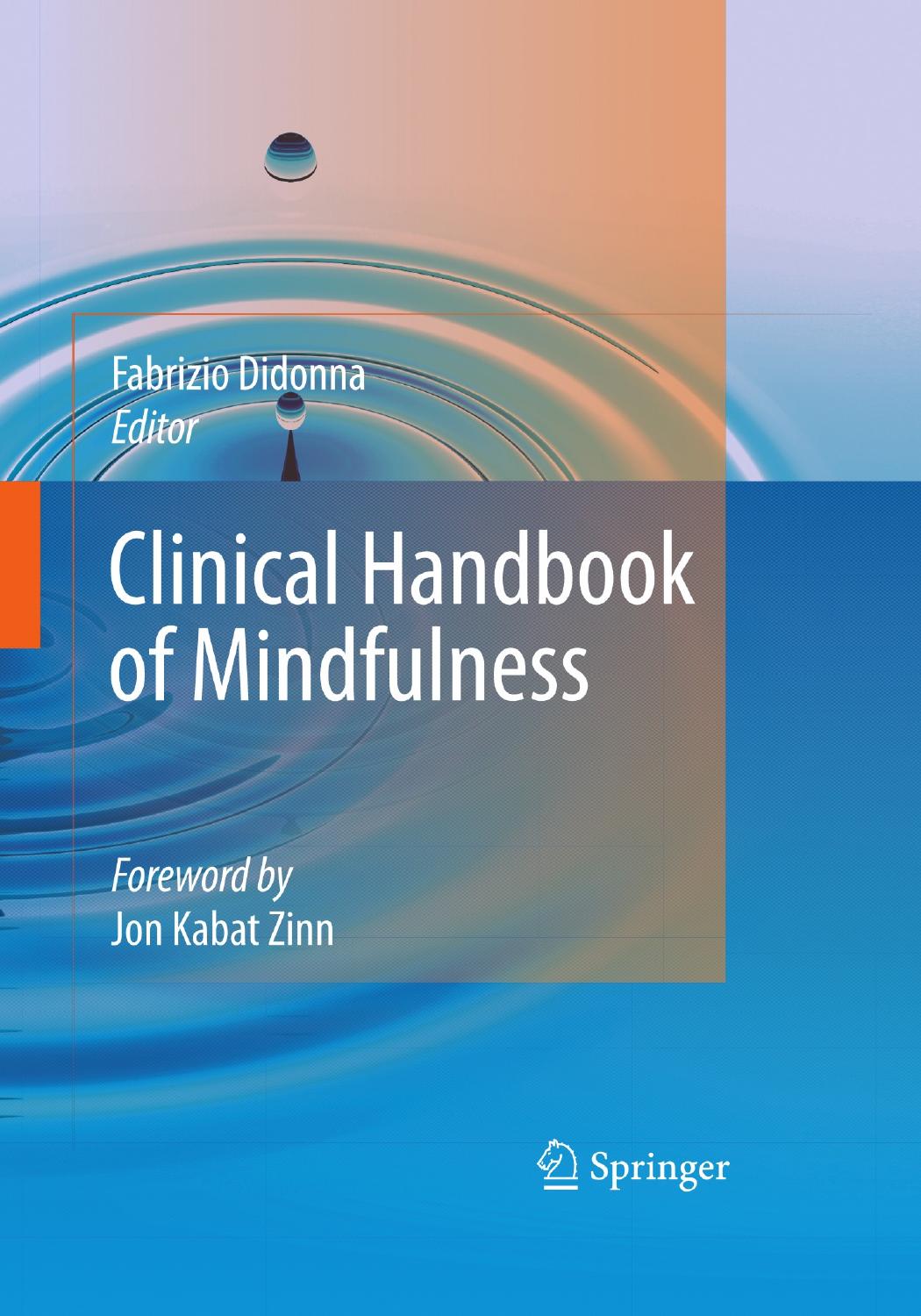Clinical Handbook of Mindfulness by Fabrizio Didonna & Jon Kabat-Zinn

Author:Fabrizio Didonna & Jon Kabat-Zinn [Didonna, Fabrizio & Kabat-Zinn, Jon]
Language: eng
Format: epub, pdf
Tags: Science, Physics, Crystallography, Chemistry, Inorganic
ISBN: 9780387095929
Google: llw470lSDAcC
Amazon: 0387095926
Publisher: Springer
Published: 2008-11-16T16:00:00+00:00
dysfunctional self-regulatory processes, allowing a shift in entrenched pat-
terns. This promising rationale is now being tested empirically in an emerg-
ing body of research that has found preliminary evidence for the efficacy
of mindfulness-based programs in reducing the core symptoms of ED. That
said, empirical clarification of the mechanisms of action in these approaches
is still in its infancy.
Mindfulness-based Interventions for Eating Disorders:
The Current State of the Evidence
Eating disorders are complex syndromes representing both specific and gen-
eralized deficits in self-regulation. These conditions frequently persist even in
the face of significant deterioration in psychological and physiological well-
ness. Given the increasing prevalence of ED coupled with the associated high
risk of relapse and concurrent psychopathology, greater attention is war-
ranted to improve the efficacy of existing treatments. In response to this
growing need, four innovative mindfulness-based therapeutic approaches
have been blended with traditional cognitive-behavioral theory: Dialecti-
cal Behavior Therapy (DBT; Linehan, 1993a), Acceptance and Commitment
Therapy (ACT; Hayes et al., 1999), Mindfulness-based Cognitive Therapy
(MBCT; Segal, Williams, & Teasdale, 2002; Baer, Fischer, & Huss, 2006), and Mindfulness-Based Eating Awareness Training (MB-EAT; Kristeller, Baer, &
Quillian-Wolever, 2006; Kristeller & Hallett, 1999).
Dialectical Behavior Therapy (DBT)
DBT was first introduced in the early 1990’s to improve the self-regulation
deficits in borderline personality disorder (BPD) (Linehan, 1993a). DBT
helps patients cultivate core mindfulness abilities in conjunction with other
emotion regulation, interpersonal effectiveness, and distress tolerance skills
(Linehan, 1993b).From an empirical standpoint, DBT has had an encouraging impact on improving clinical symptomatology in BPD (Linehan, Armstrong,
Suarez, Allmond et al., 1991; Linehan, 1993a) and is the most extensively studied mindfulness-based approach within eating disorder samples. In a
seminal analysis, Telch (1997) presented an in-depth case study of adapting DBT for an obese woman with BED. The 23-session intervention (i.e., 19
weekly meetings and 4 monthly meetings) was structured to include three
phases: (1) theoretical rationale of the program, (2) teaching principal com-
ponents of DBT and (3) reinforcing and generalizing gains (Telch, 1997). This approach yielded significant improvements in binge eating though weight
and mood symptoms did not stabilize (Telch, 1997). Telch and collaborators then tested the efficacy of the approach in a group DBT program for BED in
an initial uncontrolled trial (Telch, Agras, & Linehan, 2000); eighty-two percent of the sample attained binge-free status by the end of the 18-session pro-
gram (Telch et al., 2000; see Wiser & Telch, 1999 for a detailed description of the intervention) and abstinence rates remained high three (i.e., 80%) and
six months (i.e., 70%) post-treatment. (Telch et al., 2000). Eating, weight and shape concerns also improved, as did self-reported emotional eating urges
and negative mood regulation (Telch et al., 2000).
Chapter 14 Mindfulness-Based Approaches to Eating Disorders
269
In a more rigorous RCT (Telch, Agras, & Linehan, 2001), 44 women with BED reduced objective binge eating behaviors in both a DBT and wait-list
control condition (Telch, Agras, & Linehan, 2001). However, among the 18
that completed treatment, those in DBT showed significantly higher absti-
nence rates by the end of treatment relative to controls (i.e., 89% versus
12.5%), though sustained improvements were more modest (i.e., 56% absti-
nent at 6-month follow-up). DBT-completers were also characterized by less
weight, shape and eating concerns and on average
Download
Clinical Handbook of Mindfulness by Fabrizio Didonna & Jon Kabat-Zinn.pdf
This site does not store any files on its server. We only index and link to content provided by other sites. Please contact the content providers to delete copyright contents if any and email us, we'll remove relevant links or contents immediately.
Should I Stay or Should I Go? by Ramani Durvasula(7652)
Why We Sleep: Unlocking the Power of Sleep and Dreams by Matthew Walker(6705)
Fear by Osho(4727)
Flow by Mihaly Csikszentmihalyi(4687)
Rising Strong by Brene Brown(4449)
Why We Sleep by Matthew Walker(4434)
The Hacking of the American Mind by Robert H. Lustig(4375)
How to Change Your Mind by Michael Pollan(4355)
Too Much and Not the Mood by Durga Chew-Bose(4337)
Lost Connections by Johann Hari(4173)
He's Just Not That Into You by Greg Behrendt & Liz Tuccillo(3891)
Evolve Your Brain by Joe Dispenza(3671)
The Courage to Be Disliked by Ichiro Kishimi & Fumitake Koga(3488)
Crazy Is My Superpower by A.J. Mendez Brooks(3398)
In Cold Blood by Truman Capote(3374)
Resisting Happiness by Matthew Kelly(3337)
What If This Were Enough? by Heather Havrilesky(3308)
The Book of Human Emotions by Tiffany Watt Smith(3300)
Descartes' Error by Antonio Damasio(3270)
